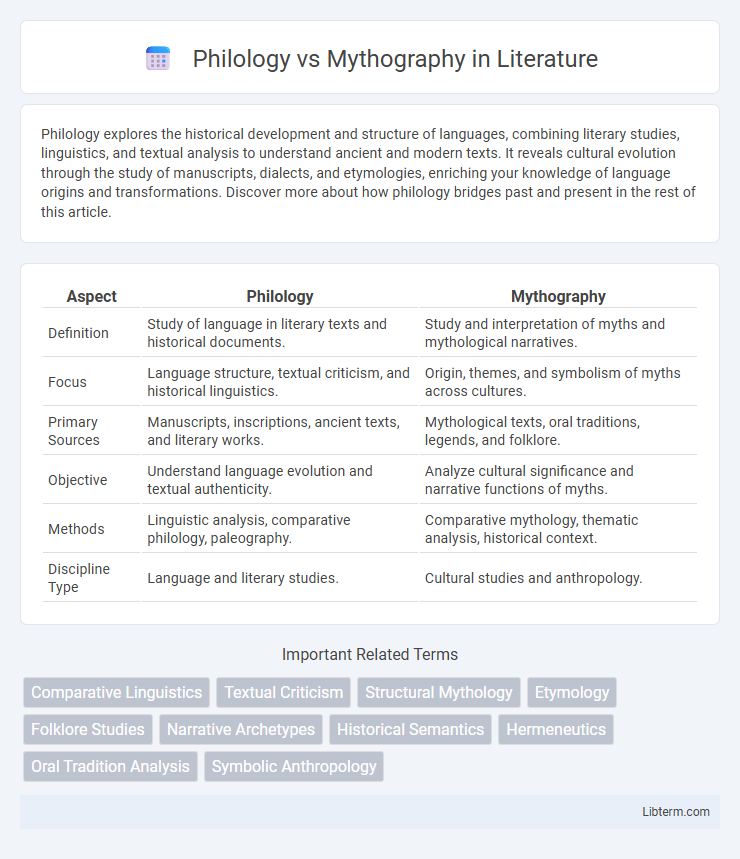Philology explores the historical development and structure of languages, combining literary studies, linguistics, and textual analysis to understand ancient and modern texts. It reveals cultural evolution through the study of manuscripts, dialects, and etymologies, enriching your knowledge of language origins and transformations. Discover more about how philology bridges past and present in the rest of this article.
Table of Comparison
| Aspect | Philology | Mythography |
|---|---|---|
| Definition | Study of language in literary texts and historical documents. | Study and interpretation of myths and mythological narratives. |
| Focus | Language structure, textual criticism, and historical linguistics. | Origin, themes, and symbolism of myths across cultures. |
| Primary Sources | Manuscripts, inscriptions, ancient texts, and literary works. | Mythological texts, oral traditions, legends, and folklore. |
| Objective | Understand language evolution and textual authenticity. | Analyze cultural significance and narrative functions of myths. |
| Methods | Linguistic analysis, comparative philology, paleography. | Comparative mythology, thematic analysis, historical context. |
| Discipline Type | Language and literary studies. | Cultural studies and anthropology. |
Introduction to Philology and Mythography
Philology centers on the historical and comparative study of languages and texts, unraveling linguistic evolution and cultural context through meticulous analysis of manuscripts and inscriptions. Mythography focuses on the collection and systematic interpretation of myths, analyzing narrative structures and symbolism to understand ancient belief systems and cultural values. Both disciplines intersect in exploring ancient texts but prioritize different methodologies: philology emphasizes linguistic precision and textual criticism, while mythography prioritizes thematic and ideological content.
Defining Philology: Scope and Methods
Philology involves the comprehensive study of language, literature, and historical texts, focusing on the analysis of linguistic structures, etymology, and textual criticism to understand cultural and historical contexts. Its methods include comparative linguistics, manuscript collation, and the interpretation of classical and ancient writings to reconstruct original meanings. In contrast to mythography, which centers on the collection and interpretation of myths and folklore, philology emphasizes systematic linguistic and literary analysis to trace development and authenticity within texts.
What is Mythography? Key Concepts
Mythography is the systematic study and compilation of myths, focusing on their origins, variations, and cultural significance. Central concepts in mythography include narrative structure, symbolic meaning, and the relationship between myth and ritual within ancient societies. Unlike philology, which analyzes language and textual history, mythography interprets mythological stories to uncover shared archetypes and societal values.
Historical Development of Philology
Philology originated as the study of ancient texts and languages, evolving through the Renaissance when scholars systematically analyzed classical literature and manuscripts to restore historical accuracy and linguistic understanding. Unlike mythography, which compiles and interprets myths often without critical textual analysis, philology emphasizes rigorous examination of language evolution, textual variants, and cultural context to reconstruct authentic meanings. Its development was crucial for modern linguistics, literary criticism, and historical studies, establishing methods to authenticate sources and trace linguistic and cultural histories across civilizations.
The Evolution of Mythography as a Discipline
The evolution of mythography as a discipline reveals its shift from mere storytelling to a systematic study of myths within cultural, historical, and linguistic contexts. Unlike philology, which primarily focuses on the analysis of language and texts, mythography emphasizes the interpretation and classification of mythological narratives across civilizations. This transformation highlights mythography's role in understanding the symbolic and socio-religious functions of myths, increasingly integrating interdisciplinary methods from anthropology, literature, and history.
Core Differences Between Philology and Mythography
Philology centers on the historical and linguistic analysis of texts, emphasizing language evolution, grammar, and literary context, while mythography specifically examines the collection, interpretation, and retelling of myths and legends. The core difference lies in philology's focus on textual and linguistic accuracy compared to mythography's emphasis on narrative content and cultural symbolism within myths. Moreover, philologists prioritize empirical evidence from manuscripts, whereas mythographers often explore oral traditions and mythological themes.
Overlapping Areas: Where Philology Meets Mythography
Philology and mythography intersect in the analysis of ancient texts and cultural narratives, where linguistic expertise helps decode mythological symbolism and origins. Both disciplines examine oral traditions, myths, and legends to reconstruct historical contexts and cultural beliefs. This overlap enhances understanding of how language shapes mythic storytelling and preserves collective memory.
Case Studies: Applying Philological and Mythographical Approaches
Case studies applying philological and mythographical approaches reveal distinct methodologies in analyzing ancient texts and cultural narratives. Philology focuses on linguistic analysis, textual criticism, and historical context to interpret the original meaning of manuscripts, exemplified in the study of Homeric epics. Mythography, by contrast, examines the thematic structures, symbolic meanings, and cultural functions of myths, as seen in comparative studies of Greek and Near Eastern mythological traditions.
Modern Relevance of Philology and Mythography
Philology remains crucial in modern linguistics, enabling the analysis of language evolution, textual criticism, and the preservation of cultural heritage through ancient manuscripts. Mythography offers valuable insights into contemporary cultural identity and narrative structures by studying myths and folklore, influencing fields like anthropology, literature, and psychology. Both disciplines intersect in the digital humanities, where philological methods support the interpretation of mythographic texts, enhancing cultural understanding and academic research.
Future Directions in the Study of Language and Myth
Future directions in the study of language and myth emphasize integrating philological methodologies with mythographic analysis to uncover deeper cultural narratives. Advances in digital humanities enable large-scale text mining and semantic mapping, transforming how researchers interpret linguistic evolution and mythic motifs across cultures. Interdisciplinary approaches combining computational linguistics, cognitive science, and comparative mythology promise new insights into the dynamic relationship between language development and myth transmission.
Philology Infographic

 libterm.com
libterm.com